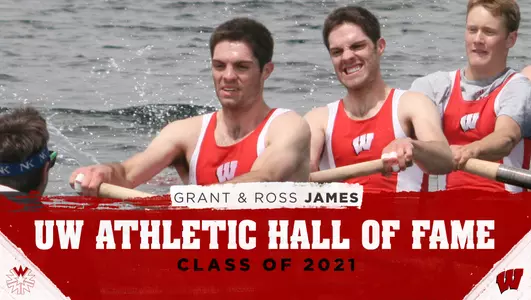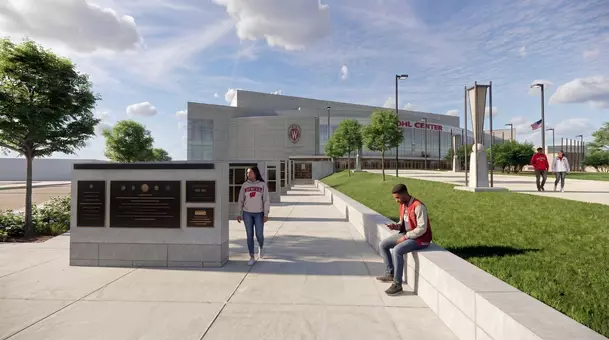
2021 UW Athletic Hall of Fame: Grant and Ross James
June 14, 2021 | General News, Men's Rowing, Mike Lucas
Brothers excelled from UW walk-ons to Olympians in men’s rowing
 |
|
|
BY MIKE LUCAS
UWBadgers.com Senior Writer
"I have a list of 1,300-1,4000 guys since I've been here," estimated Chris Clark who took over as the head coach of the men's rowing program in 1996. "And they're easily in the bottom three to four hundred on it. They're definitely among the worst ever who have rowed in the first eight (boat).
"As a rule, when you row what they rowed, it means that you're not good and you have no future. That's what it generally means … They were not good. Not good at all."
Not surprising, at all, considering the James brothers first heard about the UW crew through a generic mailing appealing to anyone taller than 6-foot-2. Later, they were pulled out of the freshman registration line at Union South because of their athletic profile. They looked the part, if nothing else.
Rangy but raw. Strong but unsure. Willing but unknowing.
"It was all very new and very hard and our initial scores on the rowing machine were so bad," conceded Grant James, who knows Clark still holds up their example as a proverbial carrot to newcomers. A before/after picture to motivate and inspire against seemingly overwhelming odds.
"Look, it doesn't matter where you start. Don't be discouraged. You can work your way up" was the way that Grant paraphrased Clark's general outreach to anyone who struggled early-on with the mechanics or the nuances or just the inherent physical demands.
"The very first practice," Ross James remembered, "we put a boat in the water and I just sat in it. Pretty tippy. You'd think these big boats would be stable. But even the big ones are tippy. Then you start messing around with an oar and try to match up with what everyone was doing. It takes a while."
That was the before snapshot of the James boys.
Before they both earned a seat in the freshman eight boat. Before they won the 2008 IRA National Championship, capping an undefeated season. Before they won the World Under-23 rowing championship. Before they competed for Team USA at the 2012 Olympics in London, England.
Look, it really doesn't matter where you start, no matter how humbling it might have been the first time on the ERG, when you finish three-tenths of a second from winning an Olympic bronze medal in a race so close that all six teams finished within one boat length of one another.
"They were generational talents," Clark cooed.
And now, Grant and Ross James, the 33-year-old twins, are UW Athletic Hall of Famers.
"If there were ever two more deserving guys," Clark said, "I don't know who they are."
As members of the 2021 HOF class, they will be inducted on Sept. 10 in Madison.
"I was taken by surprise," Grant said. "It was not something I ever considered."
"I'll admit it wasn't really on my radar," Ross added. "But it's pretty exciting to be part of a Wisconsin tradition. And pretty exciting to get to come around full circle from where it all started."
• • • •
DeKalb, Illinois is 100 miles from the Wisconsin campus and home to Northern Illinois University, Cindy Crawford, the Stage Coach Players and the James twins.
Cindy James-Warren raised her sons to be active and got them started in scouting when they were six. She was a den leader and troop leader as they advanced from Cub Scouts to Eagle Scouts.
She also initiated family camping trips every month to explore the great outdoors. Boating, canoeing, kayaking, rock-climbing and caving were popular recreations. Adventures were encouraged.
Meanwhile, for their Eagle Scout projects, Ross ended up building an analemmatic sundial at a local park, while Grant built an orienteering kit for a local forest preserve. Smart dudes. (At UW, Grant majored in mechanical engineering; Ross in biological systems engineering.)
It was through scouting that the boys got involved in high-power rifle marksmanship. It turned out to be the first national championship that they won. Mom was always in their corner, too.
"You can imagine raising two kids who were taller than her in the fifth grade and eating her out of house and home," Ross said, "and somehow managing to get them to college."
"We wouldn't be where we are without her," said Grant. "She's a Madison alum as well so there was some bias when choosing schools and she supported us when we wanted to try rowing."
As high school freshmen, Grant and Ross dabbled in baseball only because it was a sport that they had grown up playing. Scouting took up much of their time. Neither knew anything about rowing.
"There was no rowing anywhere around where we lived," Grant said.
"The first time I ever heard of rowing was the postcard," Ross said.
Ah, yes, the time-honored UW mailing/recruiting pitch. Are you over 6-2? Ever consider rowing?
"It's just the early hook," said Clark. "Where are the rowers? They're everywhere. They just haven't done it yet, unlike football or basketball where a lot of kids have been vetted.
"This is one of our ways to find kids … on and off for 15 to 20 years … we still do it."
And, yes, they still eyeball prospective rowers in the freshmen registration lines.
"They jump all the tall guys," Ross surmised quickly. "Looking back on it now, you see all the tricks they were using on you at the time to get a bunch of freshmen to show up."
Walk-ons with little or no understanding of what they were getting themselves into.
"I remember meeting those guys at SOAR in the old Union South," Clark said. "You meet tons of people who fit the athletic profile. But twins are the Holy Grail."
Ross is the oldest by four minutes. He also got labeled as the "evil" twin. Luck of the draw?
"If you have twins, how do you tell them apart?" he posed. "You start picking characteristics. One has to be good; one has to be evil. It started off as a joke."
And it stuck.
"More of a result of the rest of the team trying to figure out who was who," Grant noted. "They had to put some sort of label on one of us. Throughout our career we got treated as a collective a lot.
"When we got into the boat — we'd row either port or starboard — and you knew who was who because of the side we rowed. Coach Clark for sure had no idea who was who for the longest time."
Remember, they're not identical twins. And yet Grant had this flashback, "I remember my brother put an 'R' on his back because he got tired of people yelling the wrong name."
There was no mistaking, from Clark's perspective, some shared physical characteristics. It was something that caught his attention from the first time that he saw them in the flesh.
"You start with the frame … about 6-5, 6-6, 180," he said. "You see plenty of guys who have the frame that don't have the head and don't have the desire to punish yourself.
"Which essentially it's all about. Not in some masochistic way. But you have to be attracted to the endurance sport. Ideally, they're a perfect rowing size … like a giant cross-country runner."
As far as their individual personalities, Clark said, "Very interesting characters. They're difficult to describe. Grant was more the typical engineer. Ross was far more social."
That was fine by Chef Clark who enjoys mixing different ingredients in championship boats.
"You really need a combination of types — of personalities — on any team," he said. "You can kind of split it into people who talk a lot and are passionate, 'We're going to get this thing done.'
"A lot of guys are like that. But not everyone. There are some dead silent types that appear to have no fear whatsoever of anything and they're heart rate may not go up in any situation.
"That's these guys. They were absolute competitive athletic killers, 100 percent. At any big competition, it was just like they were going down to the 7/11. Can't have enough people like that."
It all came to fruition in June of 2008 when the Badgers upset No. 1 Washington in the 2,000-meter grand final at the Intercollegiate Rowing Association National Championship at Camden, New Jersey.
It was the first national title for UW's varsity eight in 18 years.
"It's a matter of faith on their part," Clark said afterwards. "You get that belief, you get the effort, you get the execution combined with talent and that's what we had."
The triumph capped an unbeaten season and is still frozen in time for Grant James who said, "I remember the emotion, even now, when I go back and watch the video of the race.
"When they're counting down at the starting line, I feel the same way that I felt when I was actually doing it. I also remember how much that hurt. It was over 100-degree heat index.
"Most of the race is a bit of a blur. But the beginning and end I remember the most. I definitely remember the excitement and joy of having won."
Besides the James boys, the winning boat featured coxswain Adam Barhamand, Derek Rasmussen, Zach Krupp, Ed Newman, Max Goff, George Walters and Joe McMullin.
"It was definitely a perfect storm," Ross James said. "It was an all American crew from the Midwest with no 'A' level recruits. Everything had to go right and it all came together."
As it did for the James brothers at the 2008 World Under-23 Rowing Championships. They won gold medals. Four years later, it all came together again for them. They made the Olympic team.
But it was anything but perfect. The United States failed to qualify for the World Championships which forced the eight-man team, including the James, to earn their spot in a qualifying regatta in May.
Ross had to earn his spot, too, the last spot in the U.S. boat, in April.
"That was tough and stressful," Grant said. "There was a period of time where I was a little more confident in my spot in the boat and my brother was still in the meat grinder making his seat.
"It came down to the last day where the boat had to be selected. We anticipated showing up that morning and having to do some racing to hash out my brother and another athlete for that seat.
"Instead, the coach (Mike Teti) comes up and says, 'We're not racing. We're going to take a vote and decide right now.' The other six guys in the boat stepped aside and talked.
"They assumed my vote would be for Ross and they didn't want me to skew the opinion. I'm sure Ross had the worst of it (waiting) and it was very nervous for him."
Reflecting on that experience, Ross confided, "Those were intense days. There was a good stretch there, months, when we rowed every day, and you were on the line every day.
"Every practice counted. It was tough. At the end, you showed up for the last day they had to pick the boat and there was supposed to be racing, but coach said we're not racing. And I got in."
The United States eight-man boat almost got in … the medal count in London. But placed fourth behind the odds-on favorite Germany, Canada and Great Britain.
The British clocked 5:51.18 over the course in Windsor, England. The Americans were timed in 5:51.48. That was the difference between a bronze and not medaling. Oh, so, close.
"Anything that close is going to sting for a while," Ross said. "You could race 10 times and gotten 10 different results. We definitely gave it our best shot. It was just an honor to represent your country."
"The whole experience, just everything about that was incredible," Grant said. "I don't know if just one specific moment really stands out from the rest just because all of them were so excellent."
Emboldened by that experience, Grant and Ross James targeted the Rio Olympics. But not everything went right. And it didn't come together for them. They didn't make the boat in 2016.
Through no fault of their own, according to Clark, "I felt in many ways the entire run-up to the selection for the 2016 Olympics was disorganized and flawed. That's why they weren't selected."
Rowing had been their ticket to the world. Amsterdam, Netherlands. Aiguebelette, France. Chungju, South Korea. Lucerne, Switzerland. Sydney, Australia. Bled, Slovenia. Poznan, Poland.
The James boys have since hung up their oars. Grant is a mechanical engineer at Collins Aerospace in Princeton, N.J. Ross is a senior estimator at Fueling and Technologies in Irvine, Calif.
"We had to divide and conquer at some point," Ross said. "We had lived together for most of our young and early adult life. It was only fitting we'd try to find our own way now."
Except there is still an undeniable bond. As you would expect.
"I talk to him all the time," Grant said. "We're still pretty close."
Maybe it's appropriate they're living on opposite coasts. Starboard and port, if you will.
It's easier to tell them apart.














